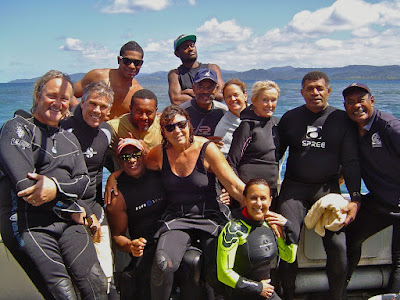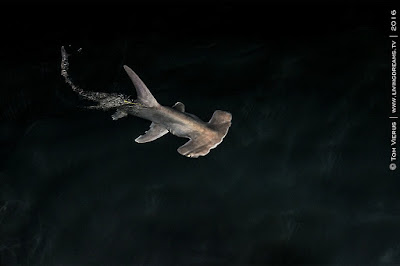Remember? It is still happening!
Well well - watch.
And this is the paper.
Shame that it's hidden behind a paywall, the more as it is being hailed as a major achievement which it quite possibly is - but I will leave that determination to others.
What however irritates me is the characterization of Fiji.
The press release has quite obviously been re-worded as the initial version stated that Fiji's Sharks are functionally extinct which is a load of horse manure - but even after the redaction, we are still being flagged as being particularly problematic which is just not true.
Here's the corresponding graph - click for detail.
Seriously, WTF?
Fiji down at the bottom - and then e.g. Tonga of all places near the top? Lemme tell 'ya that having extensively dived, and lived in both countries, this is just wrong wrong wrong in so many ways - which obviously begs the question, may other data sets be equally faulty?
So what exactly happened?
Having consulted the relevant map for Fiji,
I learn that having dropped 382 BRUVs on 14 sites, they only recorded 5
Shark and 7 Ray species, and this only on 28.7% of the videos which is perplexing to say the least. But having asked, it turns out that instead of tapping the available local capacity and know how, they decided to parachute in some dude from New Zealand
who I hear may have only sampled the sites of a particular NGO and not a
representative cross-section of Fiji's reef ecosystems - and if so I can
certainly leave it at that. *
Or to the fact that in our little region alone, we harbor at least 10 frequently encountered Sharks = GHH and Zebra, plus our usual Bull, Tiger, Sicklefin Lemon, Tawny, Silvertip, plus Grey, Whitetip and Blacktip Reefies, with several other diving operators and also research papers reporting the same and even more, equally ubiquitous reef-associated species like Scalloped Hammers or Blacktips from many other locations.
And then there's the simply massive data set from the hundreds of BRUV drops by Projects Abroad that had incidentally been initiated in collaboration with the very same Demian Chapman who is one of the paper's leading authors - surely one should have added those sightings, too?
And the data from Tonga?
They are from a grand total of 24 drops on two sites... see what I mean?
Anyway - it is what it is.
Whereas the situation here is most certainly not remotely as bad as depicted, there is equally clearly room for improvement, see e.g.this old assessment, Kerstin's papers here and especially here, and also the description of Fiji's Elasmobranch fishery here at page 188 ff.
In brief and despite of the reduction in the Asian demand for their fins, our Reef Sharks and the juvenile Sharks in the riverine nurseries are now increasingly being targeted as an alternative source of protein as many of the traditional food Fish stocks are being depleted.
And to top it off, we're now witnessing a massive Covid-19- induced increase of indiscriminate fishing and poaching that is threatening years of conservation efforts and also indirectly threatening our Shark populations by obliterating their prey.
Talking of which, I really did like reading that
Without an absolute estimate of the abundance of sharks, it is difficult to know how effective the estimated levels of conservation potential might be in restoring shark populations in reef ecosystems that have been degraded by overfishing.
Although research has shown that fully recovered reef fish communities have biomasses between 1,000 kg ha−1 (ref. 27) and 1,500 kg ha−1 (ref. 12), we have no current estimate of the size of the forage base that is required by a recovered shark population, or how the bottom-up effects of prey biomass might influence the recovery potential of reef sharks.
A key question remains as to whether management strategies that only pursue shark conservation can make substantial or limited gains, relative to those that include the restoration of the wider reef ecosystem.
If the restoration of the whole ecosystem is necessary to fully restore shark populations, our results underscore the need for managers to engage with the wider social, economic and cultural drivers of marine exploitation.
Could not agree more!
Long story short, the paper is certainly welcome.
Far from being defeatist, the authors suggest several pathways for improvement that I can only second, albeit with the usual general caveats (= e.g. follow the links here).
The good news is that here in Fiji, there is already some progress, namely the fin ban, the CMM for Sharks by the WCPFC (incidentally once again courtesy of the simply unequaled Shelley) and an upcoming, WWF-sponsored, long overdue NPOA (Sharks) that will provide a framework for subsequent regulations and pacify the FAO.
And then, hopefully, we will get The Big One.
No, likely not a Shark Sanctuary but instead this comprehensive regulation - and having checked, all appears to be on track for the December deadline at the end of this year!
In any case, we stand ready.
Thanks to Tashi Blue's boundless and also, infinitely endearing passion and commitment, her My Fiji Shark project has been able to accumulate a nice little war chest that will greatly help us assist with the implementation of the regulation.
So fingers crossed and yes, very much to be continued!
But I'm digressing as always.
Enjoy the Shark paper!
Oh and, Adopt your Shark now!
* PS - Demian informs me that there was no parachute science as the vast majority of drops was effected over several years by that local NGO - which obviously begs the question, what went wrong?
Wrong habitat/site selection? Lousy bait?
Anyway, it is what it is.




















































